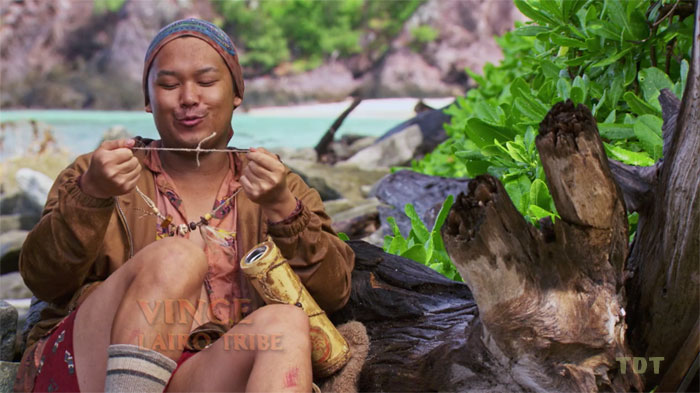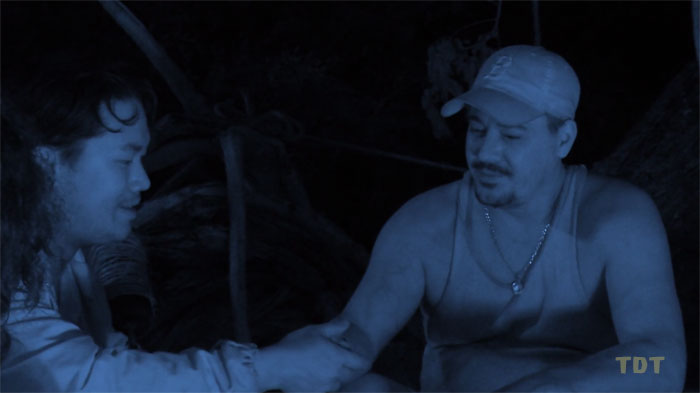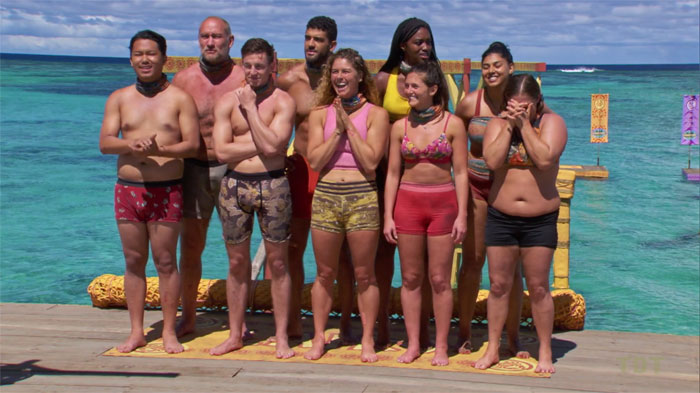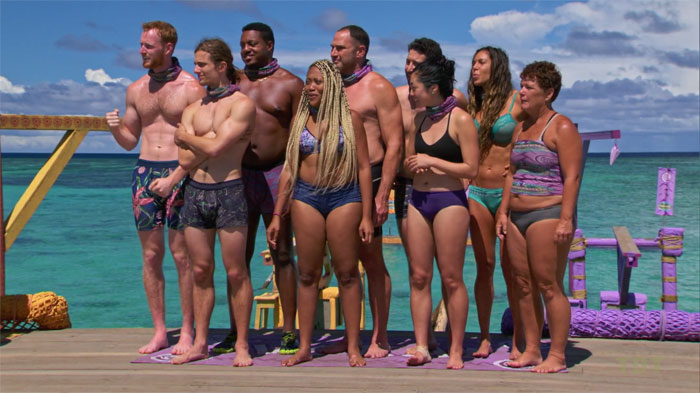

Let’s get something out of the way: I know what you’re thinking. All week, you’ve been saying, “That damn Ferrucci. He didn’t write last week because he didn’t want to admit his Winner Pick™ sucked ... again.” And I get it. Molly is one more prediction to add to my list of truly horrible predictions.
But, alas, I did not write last week because I simply ran out of time. And, yes, I was in mourning for Molly and my fantasy team. But, after this last episode, I actually think my team is in OK shape. Oh, sure, Tom isn’t long for this game, but Chelsea looks great and, of course, Janet is winning Survivor: Island of the Idols (if Boston Rob doesn’t). So I’m sorry to leave you hanging there, but I’m back and ready to bash millennials.
Oh, I kid because I love. But, seriously, Vince, to me, all season fell prey to so many academic criticisms of the entire millennial generation. A few years back, HBO Sports did a segment on what some psychologists call “trophy culture,” which is essentially what folks have labeled the idea that millennials always receive participation trophies while Gen X-ers like myself and those before never did.
Researchers have argued that giving an award to a kid for only participation gives that person a potentially false logic of entitlement. There’s a scholar named Jean Twenge who’s essentially made a career of doing research that bashes younger generations. Now, of course, she has some (controversial) data to back up her claims, but arguably her most popular book is Generation Me. The work contends that millennials have always been given things, so they’re more assertive and entitled … not good things.
The idea of trophy culture evolved from a type of pedagogy that began in the 1990s called the self-esteem movement. At the time, scholars assumed that giving rewards to young students would lead to higher self-esteem and more confidence ... both good things. This is where schools began to give students rewards for just participating ... and soon youth athletics followed suit. But, scholars like Twenge have argued there is no data to back up any positive results from this practice and, in fact, it may hurt the person.

So what does this have to do with Survivor? Well, I would argue that all season Vince looked like a victim of trophy culture. We know Vince has been through a lot in his life, but he also came across as extremely uneven and entitled as a player. Holy crap ... the way he spoke to Karishma was so downright awful and ridiculous. Why does she have to give you a name when you’re bullying her because you’re an overconfident aggressor? Vince seemed to assume that because he got randomly chosen to visit CBS Mount Rushmore Island of the Idols, he deserved to call all the shots.
In earlier episodes, Vince also gave off an entitled vibe. He made a spectacle of himself a couple times and argued obviously for self-interest instead of being self-aware and reading the room. In the end, everything folks such as Jean Twenge argue about millennials manifested itself on our screen through the avatar of Vince. He was entitled and assertive in a way that totally lacked any perspective and didn’t give a poop about the other members of his tribe.
And that, my friends is what got Vince gone. While this theory isn’t actually a theory in the social science tradition, it does illustrate how the way we teach kids could impact them later on. Do I agree with everything folks like Twenge argue? Nope. But, in some cases, her theory works. Like with Vince.
That’s all I got. Here are my thoughts on everyone right now, heading into an episode where we probably get a tribe swap:
Lairo

- Elizabeth: After her first week, Elizabeth kind of moved to the background. She’s clearly in a good position on the tribe, though, as nobody is thinking of her, and the women’s alliance seems strong. Now, a tribal swap is coming, so who knows where this will all go?
- Missy: While Lairo feels relatively predictable at this point (Dean’s next to go, right?), the side maneuvering consistently done by Missy tells me she’s one to watch moving forward. I truly think she’s getting an early, potential Winner’s Edit™.
- Dean: Out of everyone on Lairo, I think Dean needs the tribe swap the most. I also think there are a lot of players on Vokai that Dean would fit in with far better than anyone on Lairo. I mean, think about it: Most seasons are filled with dudes like Dean (socially OK, younger fit dudes straight out of fraternity central casting), but nobody on Lairo fit that description at all.
- Tom: Tom seems to be doing a really good job ingratiating himself with the women’s alliance, but I wonder how Tom will go over after a tribal swap. Honestly, he’s in the absolutely best possible position he could be in right now. That’s not lasting.
- Aaron: Like Dean, Aaron needs a tribal swap. The only difference? Aaron is a guy who loves to talk and take center stage and depending on the swap, that could be a negative. To me, Aaron doesn’t seem like he’s in a good position at all. His only hope is a swap that leaves Lairo with one more person than original Vokais. He can get to the merge in that situation … which is the best possible outcome for someone like Aaron in 2019.
- Karishma: While I applaud Karishma for surviving that awful puzzle showing, I don’t think she can win this thing at all. There are good reasons, but I just don’t think you can get that emotional and lack self-confidence this early and win.
- Chelsea: With an idol in her pocket, a dominating position within the tribe and a really stellar understanding of the game, I really like Chelsea so far. I have to say, I’m kind of rooting for her (fantasy team and all).
- Elaine: Well, I think Elaine probably needs a tribal swap also. Her tribe is primed to vote her out soon. She may make it through a potential next vote, but that’s it. A new tribe might not look at her as such a threat.
Vokai

- Lauren: A real power player last week with the Molly vote, I think Lauren could be really playing a killer under-the-radar game. She’s good.
- Janet: I’ve said it once and I’ll say it again: Welcome to the Sole Survivor Club, Janet.
- Kellee: I know she went to Island of the Idols last week, but I didn’t write that episode up so I didn’t get to make my joke. But, honestly, if you asked me to guess the name of Kellee’s boyfriend, Kellee being someone who went to Harvard and is now getting an MBA at Penn, my literal first guess would have been Brock. I think Kellee is a weird combination of too analytical and too overconfident to win this game. You can’t pull off that crying – which exit interviews suggest she didn’t – unless you’re connected to people. I don’t think she lasts much after the merge.
- Jason: Is Jason back in a good spot? I don’t know. But I do know that nobody on this tribe needs a tribe swap more.
- Jack: I feel like Jack isn’t totally engaged in the game because he misses his fellow CrossFit acolytes.
- Jamal: Oh Jamal. You simply can’t try to take hold of the game that early. And when will people learn that a final three on day three is not going to happen in 2019. I had high hopes for Jamal, but now I’m not so sure.
- Noura: You could argue that I’m dumb for saying nobody needs a tribe swap more than Jason since Noura definitely does. But, here’s the thing: No matter the tribe, Noura is not fitting in and not lasting long.
- Tommy: I’m going to keep eating my words with Tommy: I was wrong about him. This dude is playing super well.
- Dan: As long as Dan stops touching people without their consent, I feel like he can skate through for a bit. He’s not winning though. He’s another one who’s too overconfident (and therefore not self-aware enough) to win Survivor.
 Pat Ferrucci started watching Survivor when Episode Two of Borneo first aired. He's seen every episode since. Besides recapping here, he'll be live-tweeting this season from the Mountain Time Zone. Why? Because nobody cares about the Mountain Time Zone except when they want to ski. Follow him @patferrucci for Survivor stuff and tweets about anything and everything that enters his feeble mind.
Pat Ferrucci started watching Survivor when Episode Two of Borneo first aired. He's seen every episode since. Besides recapping here, he'll be live-tweeting this season from the Mountain Time Zone. Why? Because nobody cares about the Mountain Time Zone except when they want to ski. Follow him @patferrucci for Survivor stuff and tweets about anything and everything that enters his feeble mind.